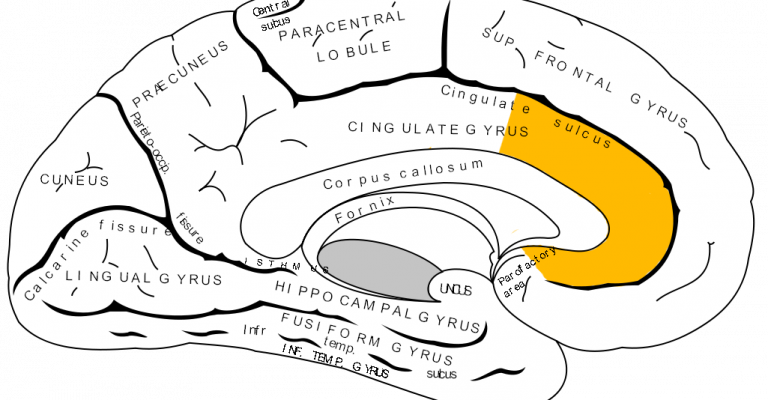Few people realize that even damage to one part of our brain, the anterior cingulate cortex, affects how we think, feel, and behave. Below, we will explore some of the functions of this important brain region, the anterior cingulate cortex. We will show what happens when it is damaged and then guide you through a patient’s rehabilitation process.
Wonders of the Anterior Cingulate Cortex
The anterior cingulate cortex is an impressive part of cognitive machinery, nestled near the front of your brain. It’s like a busy traffic control center oversight and interconnecting various parts of the brain. Its location gives it several fingers in various pies, putting this region firmly at the core of many functions.
Take emotions, for example. The anterior cingulate cortex is the ambassador between your brain’s emotional sectors-the amygdala and the hypothalamus, most notably- and the rest of your brain. This gives it a very important seat at the table regarding emotional functions.
For instance, it is responsible for matching degree emotions to various situations or events you go through daily. Decoding facial expressions and matching them to the right emotion takes the role of an orchestra conductor. This is also the one pulling the strings when you express emotions through sounds-like chuckling when you feel joyful.
Astonishingly, the anterior cingulate cortex does not stop there but also extends its influence over your pain perception. It helps manage stress-related endocrine responses-including cortisol levels. It also has a hand in key cognitive functions like decision-making, paying attention, and memory.
However, with the anterior cingulate cortex involved in so many areas, damage to this cog will surely create a wide secondary spectrum of effects. So here’s to the unsung hero of our brains: the anterior cingulate cortex silently contributing to such a wide array of functions!

Complications of Anterior Cingulate Cortex Damage
Anterior cingulate cortex damage may manifest through a variety of effects. These are usually grouped into mental, emotional, and physical categories. Keep in mind that every situation is different. As such, not all people who face this type of brain damage develop symptoms in each area. These secondary effects often vary depending on the site and extent of lesions.
Let’s have a look at some of the most common consequences in case the anterior cingulate cortex is damaged:
Poor Decision Making
The anterior cingulate cortex is an essential part of our brain in decision-making. This acts as an internal counter that weighs against the pros and cons or risks and rewards that correlate with our actions.
This complex system permits us to make aware, adaptive decisions and to take appropriate action relative to perceived dangers, thereby shielding us from injury. Without this vital capability, an individual’s judgment could be compromised; in dire circumstances, they will intentionally place themselves in harm.
It is common enough when dealing with traumatic brain injury survivors for many illusions to prevail. Survivors are sometimes found to be labeled careless when such tendencies arise from impaired decision-making abilities as a result of their injury and not from any flaw in personality.
Yet, it has to be established that irrational decisions or repeated mistakes are not precisely the person’s blame. A lesion in the anterior cingulate cortex possibly impairs the brain’s ability to learn from mistakes.
Executive Function
Most of us refer to “executive dysfunction” as the encompassing condition of the various aspects in which your thinking, feelings, and behavior can differ. It’s not one single thing; it can be a bunch of different changes, such as:
- Difficulty remembering things
- Lack of motivation
- Lack of being able to change your thoughts.
- Impulsive behavior
- Not being able to focus well
- They face challenges concerning conflict handling.
Researchers have found that this condition may be brought forth in case the anterior cingulate cortex of your brain gets damaged. This shows how big a part of this area of the brain plays in controlling our emotions, behaviors, and various mental tasks.
Flat Affect
The anterior cingulate cortex is a significant influencer of how we express ourselves. It’s actually the brain structure that changes our emotions into physical expressions. This can be made possible as it is well-connected with the limbic system that originates our feelings.
Therefore, with a sort of lesion to the anterior cingulate cortex, he may reach a point where it would be quite unlikely for him to express and convey his feelings about something happening around him. The clinical result could sometimes turn him into an individual emotionless, otherwise said an “emotion flat line.”.
Autonomic Dysfunction
The anterior cingulate cortex is more like a companion to the hypothalamus in regulating hormone release. In the case of say, fear or anger, these two portions of the brain engage as partners. In other words, they control those automatic functions in our bodies unconsciously.
But what if it is damaged in the anterior cingulate cortex? Well, the collaboration with the hypothalamus can go off-kilter. This may be problematic for the autonomic nervous system. This system takes care of involuntary body processes, such as heart rate, blood pressure, digestion, etc.
Panic Disorder
The anterior cingulate cortex in our brains has much to do with how we respond emotionally and mentally. It is pretty important. If this gets damaged, issues such as panic disorder can creep in.
Panic disorder is a kind of anxiety disorder whereby a person experiences sudden attacks of panic or fear. These quite frightening moments tend to seriously disrupt the daily routine of a person and his or her involvement in social events and community activities.
Lack of Empathy
Empathy is an instinct modulated by two parts of our brain: the anterior cingulate cortex and the amygdala. The amygdala is much more involved in processing emotional cues.
The two cooperate backstage to interlink feeling, memory, and sense information. This clever interplay helps support the capability of a person to empathize-to put himself in another person’s shoes and understand feelings or experiences.
Imagine a hiccup in the anterior cingulate cortex. Such damage has the potential to trip up this empathy-creating process in such a way that makes a person have trouble with social awareness and behavior.
This might cause a person to have problems realizing certain actions that reflect emotions such as fear or sadness. This can be exhibited through social clumsiness. It does not mean the person is ill-natured. It is just he wasn’t aware that what he did caused pain in other people’s feelings.
How to Treat Damaged Anterior Cingulate Cortex
Such somatic symptoms as body function disturbances, considering that the anterior cingulate cortex is damaged, require very close communication and cooperation with the doctor or hormone specialist.
This is the right time to observe and cure the symptoms together. The treatments vary, depending on the symptoms, and can include prescribed medicines for regulating heart rate or maintaining blood pressure level.
Further, damage to the anterior cingulate cortex can also lead to mental and emotional disorders. In all such cases, assistance from mind health, therapists of daily activities, and speech therapists can be brilliant. They are the ones who can provide excellent insight into planning the right treatment plan.
Therapists may prescribe the following treatments to the survivors of anterior cingulate cortex damage.
- Cognitive Behavioral Therapy in response to any irrational thoughts or behavior that may arise.
- Mindfulness techniques
- Better regulation of emotions and coping skills
- Occupational therapy to help manage daily activities and routines
- Speech therapy if there is some impairment in language to restore communicational skills.
It is important to address the injury to the anterior cingulate cortex with the family and caregivers. The role of this structure in decision-making, emotions, and behaviors must be discussed in adequate measure to promote necessary assistance and accommodations if needed.
Take Away
The anterior cingulate cortex is an essential portion of our brain, serving functions such as decision-making or emotional processing and the control of the autonomic nervous system. Let’s continue to know more about the complexity of our brains and how we may keep them in shape.

